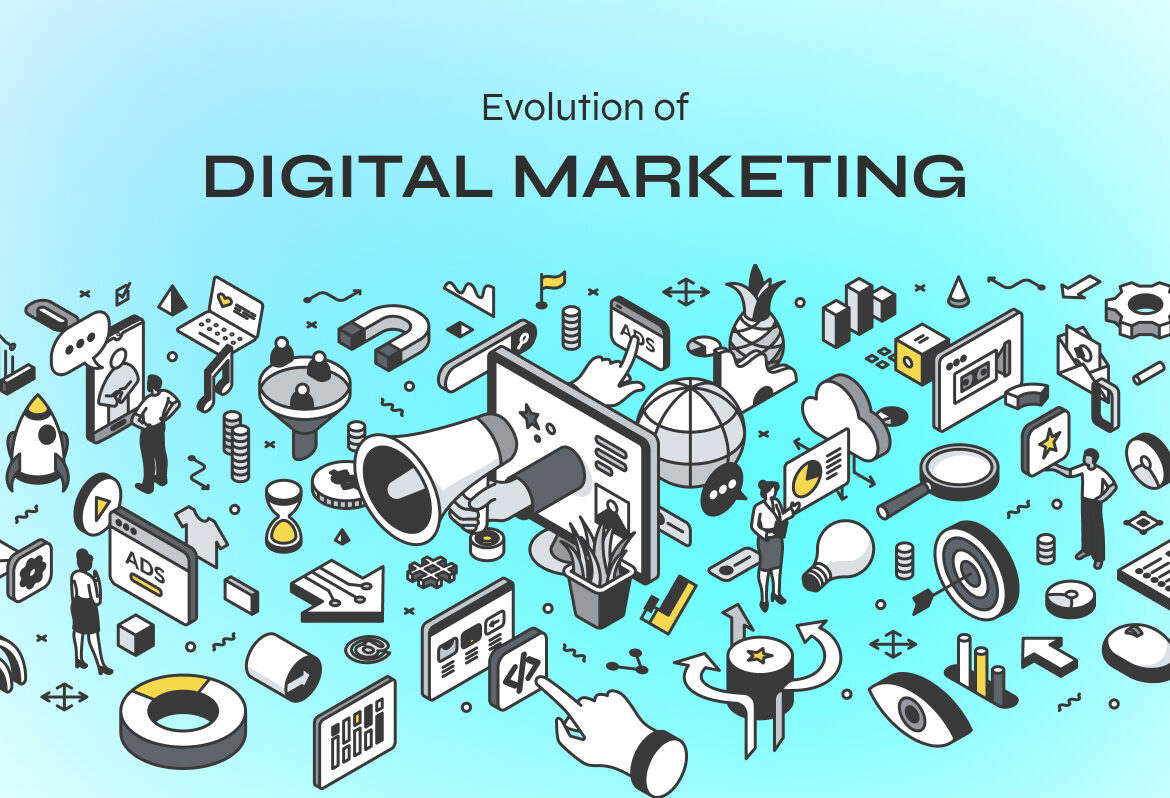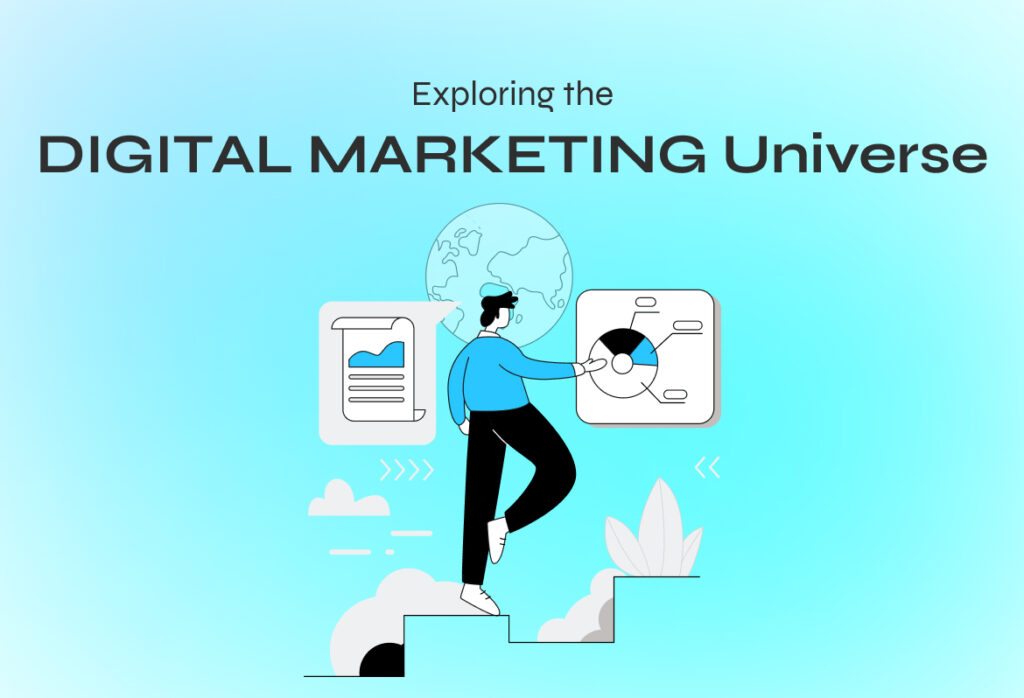Have you ever wondered about digital marketing and thought, “What’s the deal with that?” You’re not alone! It’s like trying to figure out how things work online with all those hashtags and stuff.
So, what’s digital marketing? Well, it’s basically how businesses do their thing on the internet. You know, that feeling when you were checking out those cool sneakers online, and then, bam! They show up on your social media? Yep, that’s digital marketing doing its thing!
In this comprehensive guide, we will explore the basics of digital marketing, its evolution, the importance of digital marketing, the types of digital marketing and strategies available, and the advantages it offers for businesses.
Whether you’re new to digital marketing or looking to expand your knowledge, this article will provide you with the essential information you need to understand and leverage this powerful marketing tool.
What is Digital Marketing?
In simple terms, digital marketing is the use of digital channels, such as the internet and social media, to promote products or services. It involves various online strategies and tools to reach a target audience, build brand awareness, and drive sales or engagement. Digital marketing include activities like website content, social media marketing, email campaigns, search engine optimization (SEO), and online advertising. The goal is to leverage digital platforms to connect with potential customers and achieve business objectives.
The Evolution of Digital Marketing
Digital marketing has come a long way since its inception. It has evolved alongside technological advancements and changing consumer behavior.
In the early days, digital marketing primarily consisted of email marketing and banner ads. However, with the rise of social media platforms, search engines, and mobile devices, digital marketing has become more complex and sophisticated.
Today, digital marketing encompasses a wide range of strategies and channels, including search engine optimization (SEO), pay-per-click advertising (PPC), social media marketing, email marketing, content marketing, and more. Businesses now have the opportunity to connect with their target audience in ways that were unimaginable in the past.
Why is Digital Marketing so Important?
Digital marketing plays a crucial role in the success of modern businesses. It allows companies to reach their target audience more effectively and build meaningful relationships with them. With the increasing reliance on the internet and mobile devices, businesses need to have a strong online presence to stay competitive.
One of the key advantages of digital marketing is its ability to target specific audiences. Through various digital channels, businesses can reach their ideal customers and tailor their marketing messages to resonate with them. This targeted approach leads to higher conversion rates and a more efficient use of marketing resources.
Moreover, digital marketing offers businesses the opportunity to track and measure their marketing efforts. Unlike traditional marketing methods, digital marketing provides real-time data and analytics, allowing businesses to monitor the performance of their campaigns and make data-driven decisions. This level of insight enables businesses to optimize their strategies and achieve better results.
Types of Digital Marketing Strategies
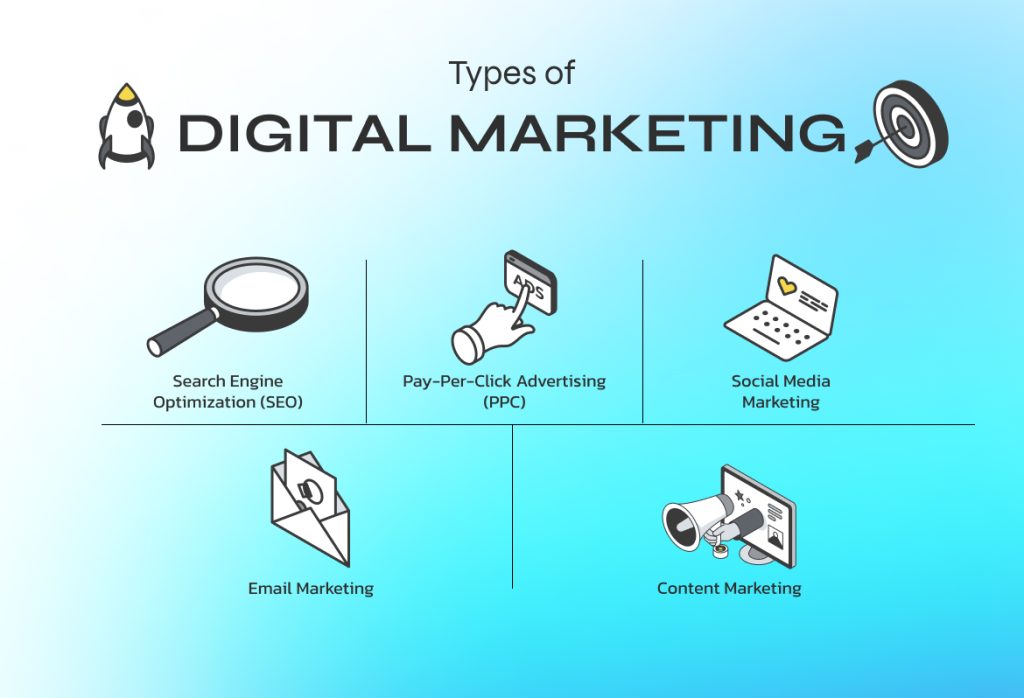
Digital marketing encompasses a wide range of strategies, each with its own unique benefits and applications. Let’s explore some of the most popular types of digital marketing strategies
1. Search Engine Optimization (SEO)
Search Engine Optimization (SEO) is the process of optimizing a website to improve its visibility and ranking on search engine results pages. By optimizing various elements of a website, such as its content, structure, and technical aspects, businesses can increase their organic (non-paid) traffic from search engines.
But how impactful is SEO from a marketing and ROI perspective? According to the statistics, it is a lot more than you would be expecting.
2. Pay-Per-Click Advertising (PPC)
Pay-Per-Click (PPC) advertising is a digital marketing strategy in which advertisers pay a fee each time their ads are clicked. This model allows businesses to bid on keywords and display their ads at the top of search engine results pages or on relevant websites. The most popular PPC advertising platform is Google Ads.
PPC advertising offers businesses instant visibility and control over their ad campaigns. With the ability to set budgets, target specific keywords, and track conversions, businesses can achieve a high return on investment (ROI) through targeted advertising.
3. Social Media Marketing
Social media marketing involves using social media platforms such as Facebook, Instagram, Twitter, LinkedIn, and YouTube to promote products or services. It allows businesses to connect with their target audience, build brand awareness, and engage with customers on a more personal level.
Social media marketing involves creating and sharing engaging content, running targeted ad campaigns, and interacting with followers. It provides businesses with valuable insights into their audience’s preferences and behaviors, allowing them to tailor their marketing efforts accordingly.
4. Email Marketing
You might have encountered claims that email marketing is on the decline or even declared dead. Disregard such notions.
The reality is, this narrative has persisted for so long that reputable news sources began labeling email as a “cutting-edge method” to connect with customers as early as 2019.
Certainly, it’s a powerful tool, but its effectiveness is far from being a recent discovery.
With the potential for a return on investment reaching up to 4400%, email marketing continues to stand out as the most effective means to both attract and retain customers.
So, what’s email marketing and how does it work?
Email marketing is the practice of sending targeted emails to a group of subscribers or customers. It is an effective way to nurture leads, promote products or services, and build customer loyalty. Email marketing campaigns can be personalized, automated, and segmented based on customer behavior and preferences.
Businesses can use email marketing to deliver valuable content, announce promotions, send newsletters, and build relationships with their audience. With the right email marketing strategy, businesses can drive conversions and generate repeat business.
5. Content Marketing
Content marketing involves creating and distributing valuable and relevant content to attract and engage a target audience. It focuses on providing information, solving problems, and building trust with potential customers. Content marketing can take various forms, including blog posts, videos, infographics, ebooks, podcasts, and more.
By consistently delivering high-quality content, businesses can establish themselves as industry leaders and attract a loyal following. Content marketing also plays a crucial role in SEO, as search engines value fresh, informative content that provides value to users.
These are just a few examples of the types of digital marketing strategies available. Each strategy has its own unique benefits and can be tailored to suit the specific goals and target audience of a business.
Advantages of Digital Marketing
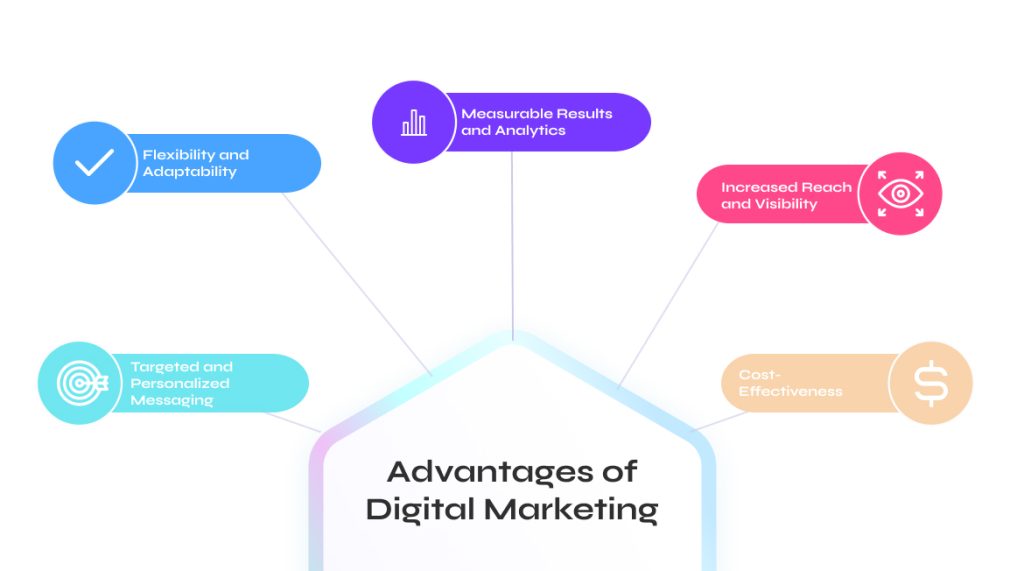
Digital marketing offers numerous advantages for businesses of all sizes. Let’s explore some of the key benefits:
1. Increased Reach and Visibility
One of the biggest advantages of digital marketing is its ability to reach a larger audience than traditional marketing methods.
With billions of people using the internet and social media platforms, businesses can connect with potential customers around the globe.
80% is how much search ads can increase brand awareness.
Digital marketing allows businesses to expand their reach and increase brand visibility, leading to more opportunities for growth.
2. Targeted and Personalized Messaging
Digital marketing enables businesses to target specific audiences based on demographics, interests, and online behavior.
This targeted approach ensures that marketing messages are delivered to the right people at the right time.
Personalized messaging creates a more engaging and relevant experience for customers, increasing the likelihood of conversions and customer loyalty.
3. Cost-Effectiveness
Compared to traditional marketing methods such as print ads or TV commercials, digital marketing is often more cost-effective.
Businesses can allocate their marketing budget more efficiently by focusing on digital channels that offer higher ROI. Additionally, digital marketing allows for precise budgeting and targeting, ensuring that marketing resources are utilized effectively.
4. Measurable Results and Analytics
One of the greatest advantages of digital marketing is the ability to track and measure the results of marketing campaigns.
Digital analytics tools provide businesses with valuable insights into the performance of their campaigns, allowing them to make data-driven decisions.
By monitoring key performance indicators (KPIs), businesses can identify what is working and what needs improvement, leading to continuous optimization and better results.
5. Flexibility and Adaptability
Digital marketing offers businesses the flexibility to adapt their strategies and tactics quickly. Unlike traditional marketing methods that may take weeks or months to implement changes, digital marketing allows for real-time adjustments.
This agility enables businesses to stay ahead of the competition, respond to market trends, and meet the evolving needs of their target audience.
These advantages make digital marketing an essential tool for businesses looking to grow their online presence, reach more customers, and achieve their marketing goals.
How to Get Started with Digital Marketing
Getting started with digital marketing may seem overwhelming, but with the right approach, anyone can learn and implement effective strategies. Here are some steps to help you get started:
1. Define Your Goals and Objectives
Before diving into digital marketing, it’s important to define your goals and objectives. What do you want to achieve with your digital marketing efforts? Do you want to increase brand awareness, drive website traffic, generate leads, or boost sales? Setting clear goals will help you stay focused and measure your success.
2. Identify Your Target Audience
Understanding your target audience is crucial for effective digital marketing. Who are your ideal customers? What are their demographics, interests, and online behaviors? Conduct market research and create buyer personas to gain a deeper understanding of your audience. This will guide your digital marketing strategies and messaging.
3. Choose the Right Digital Marketing Channels
There are various digital marketing channels to choose from, and selecting the right ones for your business is essential. Consider your target audience and where they spend their time online. Some popular channels include search engines, social media platforms, email, content marketing, and mobile apps. Each channel has its own unique advantages and can be used to achieve different marketing goals.
4. Create Compelling Content
Content is the backbone of digital marketing. Create high-quality, valuable, and relevant content that resonates with your target audience. Whether it’s blog posts, videos, infographics, or social media posts, focus on providing value to your audience and addressing their pain points. Consistently producing compelling content will help you build trust and establish your brand as an industry authority.
5. Optimize for Search Engines
Search engine optimization (SEO) is essential for improving your website’s visibility and ranking on search engine results pages. Conduct keyword research and optimize your website’s content, meta tags, and structure to ensure it aligns with search engine algorithms. By implementing effective SEO strategies, you can increase organic traffic and attract highly qualified leads.
6. Leverage Social Media
Social media platforms provide an excellent opportunity to engage with your target audience and build brand awareness. Create a social media presence on platforms that align with your audience’s preferences. Develop a content strategy that includes a mix of informative, entertaining, and engaging content. Engage with your audience through comments, shares, and direct messages to foster meaningful connections.
7. Monitor and Analyze Your Results
Regularly monitor and analyze your digital marketing efforts to measure their effectiveness. Utilize analytics tools and track key metrics such as website traffic, engagement rates, conversions, and ROI. This data will provide insights into what’s working and what needs improvement. Make data-driven decisions and continuously optimize your strategies to achieve better results.
Digital Marketing Tools and Resources
Digital marketing is supported by a wide range of tools and resources that can help streamline your efforts and enhance your productivity. Here are some essential digital marketing tools to consider:
1. Google Analytics
Google Analytics is a powerful tool that provides valuable insights into website traffic, user behavior, and conversions. It allows you to track key metrics, set up goals, and generate detailed reports. With Google Analytics, you can measure the effectiveness of your digital marketing campaigns and make data-driven decisions.
2. Social Media Management Tools
Social media management tools like Hootsuite, Buffer, and Sprout Social help you schedule, publish, and manage your social media content. These tools enable you to monitor social media conversations, engage with your audience, and track the performance of your social media campaigns.
3. Email Marketing Platforms
Email marketing platforms like Mailchimp, Constant Contact, and HubSpot allow you to create and manage email campaigns. These platforms offer features such as email automation, segmentation, personalization, and analytics. Email marketing platforms make it easy to nurture leads, promote products or services, and build strong customer relationships.
4. Content Management Systems (CMS)
Content management systems like WordPress, Drupal, and Joomla simplify the process of creating and managing website content. These platforms provide user-friendly interfaces, customizable templates, and plugins that enhance functionality. CMS platforms make it easy to publish and update content, optimize for SEO, and provide a seamless user experience.
5. Keyword Research Tools
Keyword research tools like Google Keyword Planner, SEMrush, and Ahrefs help you identify relevant keywords and phrases for your digital marketing campaigns. These tools provide insights into search volume, competition, and related keywords. By conducting thorough keyword research, you can optimize your content and improve your website’s visibility in search engine results.
These are just a few examples of the many digital marketing tools and resources available. The choice of tools will depend on your specific needs and budget. Research and experiment with different tools to find the ones that work best for your business.
Digital Marketing Trends to Watch Out For
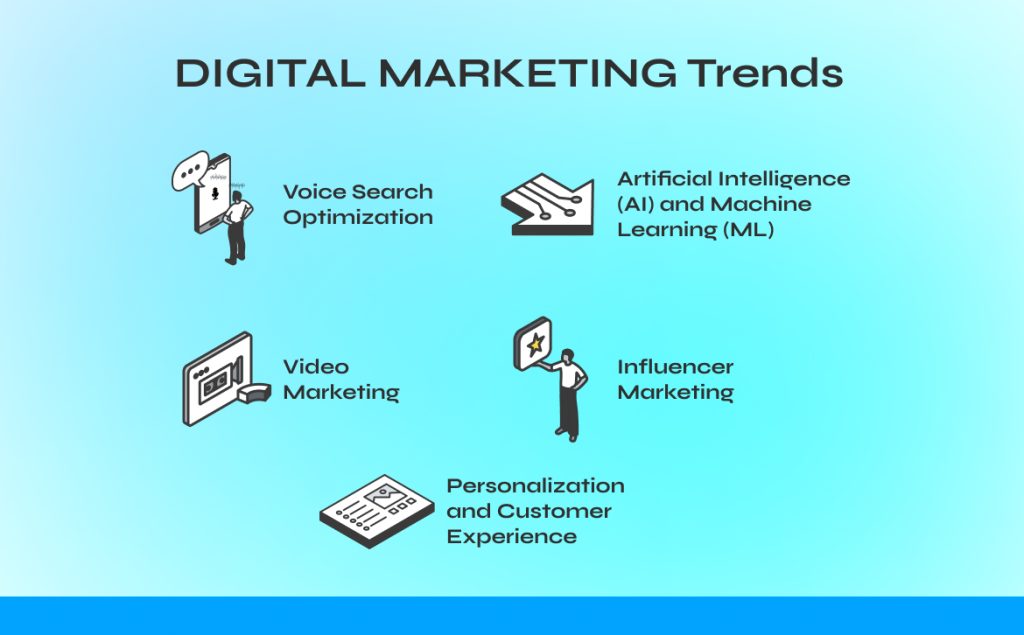
Digital marketing is a dynamic field that continues to evolve. Staying updated with the latest trends and emerging technologies is crucial for staying ahead of the competition. Here are some digital marketing trends to watch out for:
1. Voice Search Optimization
With the rise of voice assistants like Siri, Alexa, and Google Assistant, voice search is becoming increasingly popular. Optimizing your website and content for voice search queries can help you reach a wider audience and improve your search engine rankings.
2. Artificial Intelligence (AI) and Machine Learning (ML)
AI and ML technologies are revolutionizing digital marketing. These technologies can analyze vast amounts of data, automate repetitive tasks, personalize user experiences, and optimize marketing campaigns. Incorporating AI and ML into your digital marketing strategies can lead to more efficient and effective results.
3. Video Marketing
Video continues to dominate the digital landscape. It has become one of the most engaging and shareable forms of content. Incorporating video into your digital marketing campaigns can help you capture attention, convey complex information, and increase brand awareness.
4. Influencer Marketing
Influencer marketing involves partnering with influential individuals or popular social media personalities to promote your products or services. Collaborating with influencers can help you reach a wider audience and build trust with potential customers.
5. Personalization and Customer Experience
Personalization is becoming increasingly important in digital marketing. Tailoring your marketing messages and experiences to individual customers can significantly improve engagement and conversions. Utilize customer data and automation tools to deliver personalized content and experiences.
These are just a few of the digital marketing trends that are shaping the industry. It’s important to stay informed and adapt your strategies accordingly to leverage these trends for your business’s success.
Conclusion
Digital marketing is a powerful tool that can help businesses reach and engage with their target audience in meaningful ways. It has evolved alongside technological advancements and changing consumer behavior.
Digital marketing plays a crucial role in today’s business landscape, offering numerous advantages such as increased reach and visibility, targeted messaging, cost-effectiveness, measurable results, and flexibility.
By understanding the different types of digital marketing strategies, leveraging the right tools and resources, and staying updated with the latest trends, businesses can harness the power of digital marketing to achieve their marketing goals and drive growth.
If you’re a small business owner or just starting with digital marketing, SilverstoneTec is here to help. We can guide you and help your business grow online. Whether you’re new to this or not sure where to start, SilverstoneTec has a track record of making businesses like yours successful online.
Frequently Asked Questions:
Q: What is digital marketing?
A: Digital marketing is the use of digital technologies and platforms to promote products and services and connect with potential customers. It encompasses various strategies and channels such as search engine optimization, social media marketing, email marketing, content marketing, and more.
Q: What are the advantages of digital marketing?
A: Some advantages of digital marketing include increased reach and visibility, targeted and personalized messaging, cost-effectiveness, measurable results and analytics, and flexibility and adaptability.
Q: How can I get started with digital marketing?
A: To get started with digital marketing, define your goals and objectives, identify your target audience, choose the right digital marketing channels, create compelling content, optimize for search engines, leverage social media, and monitor and analyze your results.
Q: What are some essential digital marketing tools?
A: Some essential digital marketing tools include Google Analytics, social media management tools, email marketing platforms, content management systems, and keyword research tools.
Q: What are some digital marketing trends to watch out for?
A: Some digital marketing trends to watch out for include voice search optimization, artificial intelligence and machine learning, video marketing, influencer marketing, and personalization and customer experience.

